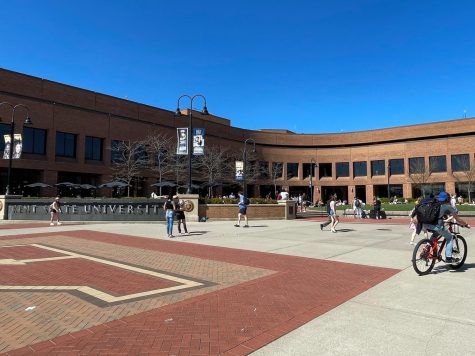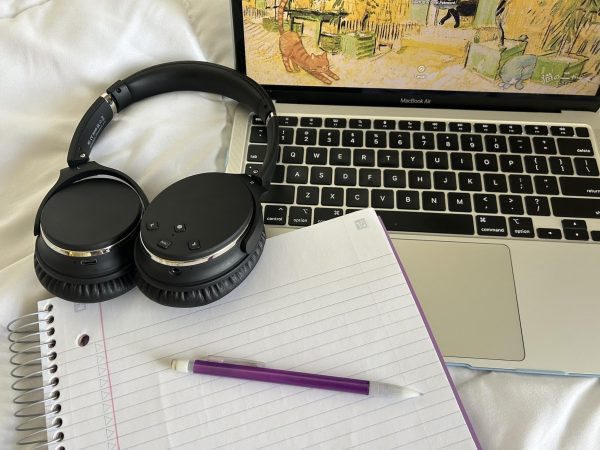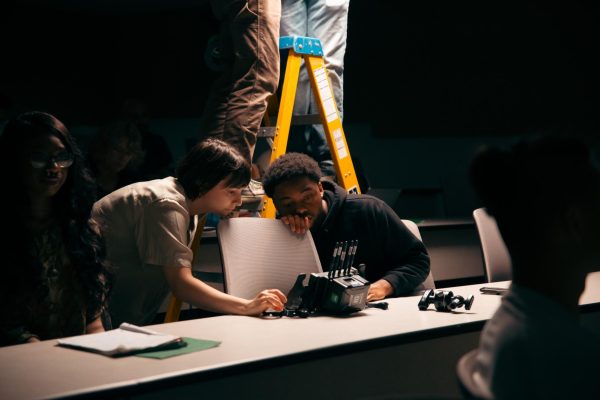KASA asks students to help make a real difference in Darfur
December 4, 2007
Associate professor Wendy Wilson Fall spoke about the war in Darfur during last night’s awareness event in the Kiva. Approximately 400,000 people have been killed, and nearly 2.5 million other civilians have been forced to live in camps in the Sudan. Heat
Credit: Ron Soltys
As students entered the Kiva last night for the program “Speak Now, or Forever Live With Guilt: Stop Genocide, Save Darfur,” they were separated into two groups.
Some were separated from the friends they had come with, while others were able to stick together. To begin the program’s events, Vanessa Opoku, Kent African Student Association vice president, told attendees that in Darfur, thousands have suffered this same separation.
“If we were in Darfur right now, this side would be murdered,” she said gesturing to the right side of the room, “and this side would be refugees, but are you safe?”
Throughout last night’s program, presented by KASA, speakers made it clear to students that refugees in Darfur are not safe, and that it is up to individuals to make a difference and remedy the situation.
“People in Darfur have basically left their lives to the international community,” said Dan Teng’o, a student in journalism and mass communication who spoke about his experiences as a journalist in Darfur and Sudan. “They’re helpless without us. Unfortunately, the international community moves very slow.”
While Teng’o was in Darfur, he said he was struck with a level of suffering he had never before seen.
“You see children who have been displaced from their homes,” he said. “You see women who have been raped, you see children who have seen their mothers being raped, you see children taking care of children.”
He said he also saw efforts to help that ultimately failed.
“One of the things that depressed me a lot was a lot of efforts being put into saving people’s lives, but with all these efforts, people still die,” he said.
During Thanksgiving break, KASA board members had the opportunity to interview Elise Kwizera, an Ohio State student who had survived genocide in Rwanda as a young girl. They showed video of the interview to students who attended last night.
Kwizera shared her experience of the night genocide in Rwanda began. She was 8 years old at the time and said she did not really understand the situation at first – she thought the gunshots firing through the night were people walking around in high heels.
“At first, I wouldn’t say I was scared,” she said. “I would say I was more confused. I didn’t get scared until I realized that we spent the whole night in the hallway, and those were not shoes — they were gunshots.”
She lost cousins and other relatives to genocide, but she and her immediate family survived.
“Honestly, I think I owe it to God, because there were so many times that I could have died, that my parents could have died, that my little brother or sister could have died,” she said. “It seemed like there was an invisible arm that was walking with us.”
She said surviving such a crisis did not hit her fully until 2004 when she was watching a documentary about the Rwanda genocide on PBS with a friend. Since then she said she has been vocal about raising awareness about genocide.
“I’ve been talking about it since 2004, but it’s been three years now, and it’s still going on,” she said. “I’d rather tell one person than none at all.”
Wendy Fall, associate professor in Pan-African Studies, spoke to students about some of the history associated with genocide. She urged people to see their lives as a part of a bigger world: that investing in Darfur is also investing in our own people.
“These economies are buckling under the weight of the industrial North,” she said. “Somehow we need to think about that balance.”
Contact minority affairs reporter Christina Stavale at [email protected].























